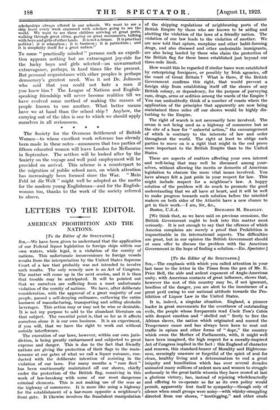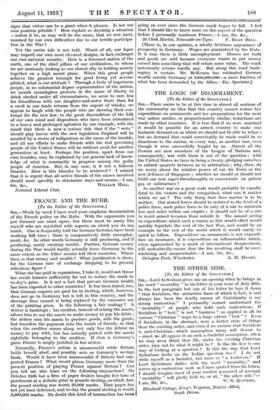[To the Editor of the SPECTATOR.] SIR,—The emphasis with which
you called attention in your last issue to the letter in the Times from the pen of Mr. E. Price Bell, the able and ardent exponent of Anglo-American unity, with American contacts of great influence, shows that, however the rest of this country may be, if not ignorant, heedless of the danger, you are alert to the imminence of a great peril owing to our national attitude towards the Pro- hibition of Liquor Law in the United States.
It is, indeed, a singular situation. England, a pioneer leader in great movements for the overthrow of outstanding evils, the people whose foreparents read Uncle Tom's Cabin with deepest emotion and " shelled out " freely to free the African slaves, the nation which originated and nursed the Temperance cause and has always been keen to rout out traffic in opium and other forms of " dope," the country which owns the Mother of Parliaments, with, it might well have been imagined, the high respect for a morally-inspired Act of Congress implied in the fact : this England of character and renown, this standard-bearer of Morality and Righteous- ness, seemingly unaware or forgetful of the spirit of zeal for clean, healthy living and a determination to end a great iniquity and humiliation which has over several decades animated many millions of ardent men and women to struggle arduously in the great battle wherein they have scored at last a glorious victory, has, instead of rejoicing wholeheartedly and offering to co-operate so far as its own policy would permit, apparently lent itself to sympathy—though only of silence when small groups were noisy—with whisky-smuggling directed from our shores, " bootlegging," and other crude
signs that virtue can be a giant when it pleases. Is not our own position pitiable ? How explain so shocking a situation —unless it be, as may well be the cause, that we rest inert, numbed by our own difficulties due to our terrific participa- tion in the War ?
Yet the entire tale is not told. Worst of all, our lapse may imperil our own most elevated designs, in fact, endanger our own national security. Here is a foremost nation of the earth, one of the chief pillars of our civilization, to whom we are anxiously looking as our closest ally in holding society together on a high moral plane. When this great people achieve the greatest triumph for good living yet accom- plished, what is our attitude ? Through a body of impetuous people, in no substantial degree representative of the nation, we mouth meaningless protests in the name of liberty to drink alcohol under all circumstances, we seem to care less for friendliness with our daughter-and-sister State than for a swell in our trade returns from the export of whisky, we appear to laugh with the people who are showing their con- tempt for the new law, to the great discomfiture of the folk of our own mind and disposition who have been stimulated to a heavy and prolonged agitation by our example, with the result that there is now a serious risk that if the " wets " should play havoc with the new legislation England will be assailed by a storm of indignation as the cause of the trouble, and all our efforts to make friends with the real governing people of the United States will be without avail for another generation at least. Perhaps the position, apart from our own troubles, may be explained by our general lack of know- ledge of what is constantly in progress among the godly people of America. But, in any case, is it not a hideous blunder. How is this blunder to be retrieved ? I submit that it is urgent that all active friends of the causes involved should meet speedily to determine ways and means.—I am,



































 Previous page
Previous page